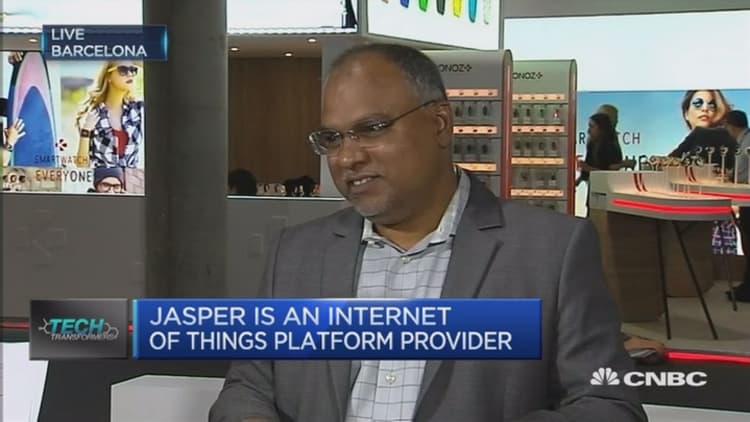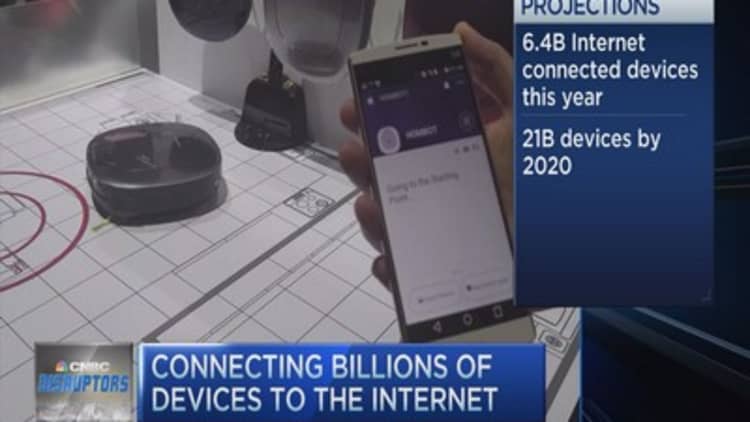Bored with your outfit? Imagine if you could change the color of your shirt, using just your smartphone.
A group of female tinkerers in Bangkok, Thailand, have figured a way to do just that. Using a thumb-sized circuit board called the ESPresso Lite V2.0, the members of PINN Creative Space have built a system that lets people use their smartphones to change the colors of tiny LED lights embedded in a T-shirt.
The not-so-simple T-shirt is part of the Internet of Things (IoT) - the growing network of everyday objects with internet connectivity, which allows them to interact in the way we take for granted in PCs and smartphones.
Cisco, Sony, and more recently, Samsung, are among multinational companies that are investing in IoT.
But the start-up behind the ESPresso Lite wants to coexist with the "big boys." Singapore-based IoT company ESPert, which created the tiny circuit board, wants amateur hobbyists to be able to build their own IoT gadgets at an affordable price. The Thai hobbyists' "I-o-Tee" is one example of what can be made with the technology.
The ESPresso Lite contains a chip that enables devices to "speak" to one another via the cloud, using a Wi-Fi connection. Priced at $10, it retails mostly online in 14 countries across Asia, as well as in Australia, Europe and the U.S. In two months, ESPert has sold about 5,000 units.
For CEO William Hooi, who co-founded ESPert in 2015, it is about "democratizing access and production" in the burgeoning IoT space.
"Big companies, unfortunately, don't have the sensing from the ground on what people want to buy," the 42-year-old tells CNBC. "We know because we are small enough, but of course, our size restricts us."
ESPert is one of an increasing number of IoT startups in Asia. The bootstrapped, or founder-funded, company believes that its very existence is a by-product of the growing DIY culture in Southeast Asia.
Hooi and his co-founder, Thai national Panutat Tejasen, 63, are both pioneers of the rising "maker movements" in their home cities, Singapore and Chiang Mai.

Hooi was an educator for over a decade, at one point teaching design and technology at high schools, before he made the switch into entrepreneurship. In 2014, he co-founded One Maker Group, a consortium that runs maker clinics and operates a prototyping lab for independent makers, with resources such as 3D printers and laser machines.
A "maker" is anyone who uses open-source culture, traditional craft and technology to independently create their own products or systems.
He is also founding executive director of the Singapore Makers' Association, a non-profit designed to support the city-state's the fledgling maker community.
Tejasen, meanwhile, has been the CEO of his own mobile app company, Jimmy Software, since 1997. Three years ago, he realized that more Thais were becoming interested in making their own gadgets, but that they didn't have a space to meet. In response, he founded the Chiang Mai Makers' Club and organized "maker parties" for the community.
It was at such maker gatherings that Hooi and Tejasen discovered a common passion for IoT. And during a trip to China last April, they found their eureka moment.

The duo met Teo Swee Ann, the CEO of Espressif Systems, a Shanghai-based circuit board manufacturer. Teo showcased his latest product, the ESP8266, a tiny chip with Wi-Fi connectivity, that costs under $3 a piece.
Hooi and Tejasen were impressed by how the chip was affordable, yet on par with the quality of those made by big names, including Texas Instruments and Broadcom.
"This chip is a masterpiece," Tejasen says. "When we met with Teo, we saw how it could become very popular, and got this business idea."
At the time, several component manufacturers, such as the China-based NodeMCU and U.S. hardware companies Adafruit Industries and Sparkfun Electronics, had already used the ESP8266 to create their own Wi-Fi-connected boards for makers.
But Hooi and Tejasen saw there was a large, untapped market in Southeast Asia.
In the span of five weeks, they designed their own board, the ESPresso Lite. And the pair then reached out to Cytron Technologies, a Malaysian robotics and electronics company, to refine the product and put it out on the market.

"This board is conceptualized in Singapore, designed in Thailand and made in Malaysia," Hooi notes. "It bears the DNA of the region."
And ESPert is betting that its Southeast Asian identity will give them an edge over potential competitors likely to emerge from China, in terms of the perceived quality of the product.
In the months ahead, Hooi is stepping up efforts to look for investor funding. Meanwhile, the company is also branching out into manufacturing simple consumer products, to cater to the what he reckons is the 90 percent of people who just want to use IoT products rather than to make them.
Their latest prototype is Homio, a motion sensor that triggers a mobile alert when a door or window is opened. Hooi hopes to be able sell such consumer products at around $20, and he claims that ESPert is one of few companies that would be willing to set such a low price point.
"IoT can be a scary term, but we want people to pick up our products without any barriers," he says. "Just buy the product, turn it on, and use our (mobile) app to control it."
"IoT should be accessible and affordable for everyone," he adds.

